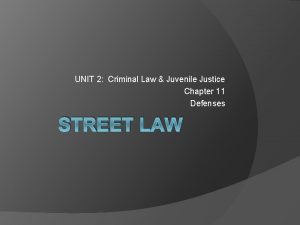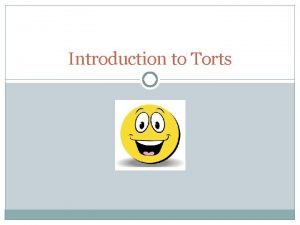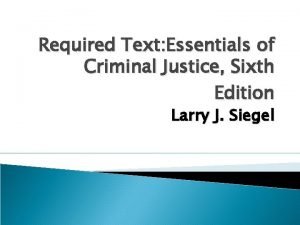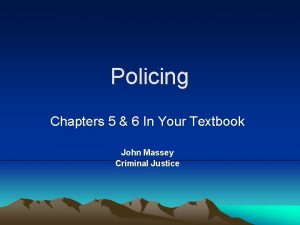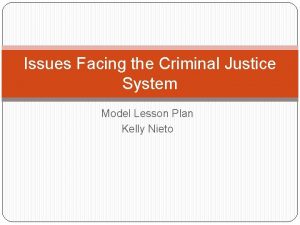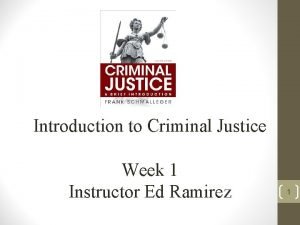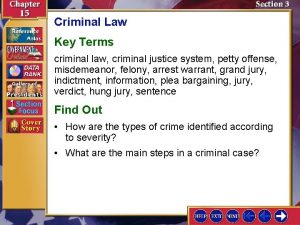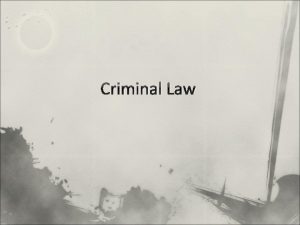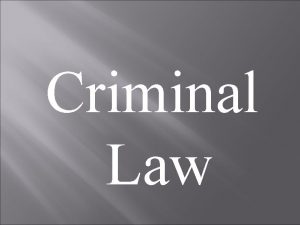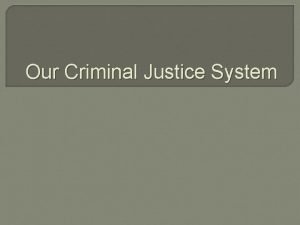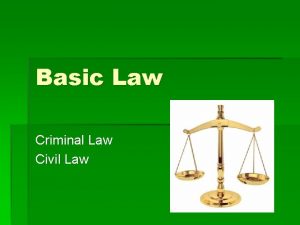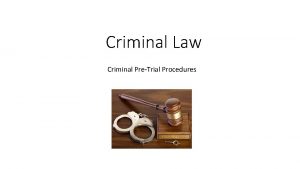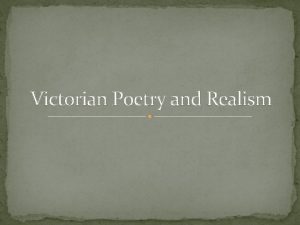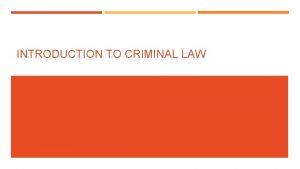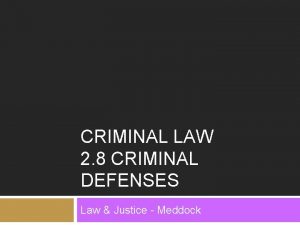Criminal Law and Justice Learning Intentions The Victorian










- Slides: 10

Criminal Law and Justice

Learning Intentions • The Victorian criminal justice system Success Criteria • • Distinction between summary and indictable offences Burden of proof Standard of proof Presumption of innocence

Introduction to Criminal Law • What is a crime? • Act or omission committed against the community at large that is punishable by the law. A person suspected of a criminal offence is prosecuted by the state. • Two elements • actus reus – guilty act • mens rea – guilty mind • Exception • Strict liability crime – wrongful act alone establishes the crime eg speeding

Parties to a Criminal Case A criminal case involves two parties: The State (ie Government) represented by The Prosecution – on behalf of the people and with the authority of the Crown. Vs The Accused (the Victim is not party to a criminal case and does not bring the court action) The State Police (Local Councils, Vic Roads, Worksafe Victoria etc) Office of Public Prosecutions (OPP) Director of Public Prosecutions (DPP) Magistrates Court County court Supreme Court

Types of Criminal Offences • Summary Offences Minor crimes that are heard in the Magistrates’ Court and before a magistrate, but not before a jury. • Eg drinking in a public • Indictable offences Serious crimes that are heard before a judge and jury. Most serious are heard in the Supreme Court eg murder, manslaughter, treason and culpable driving. Others are heard in the County Court.

Indictable Offences Heard Summarily These are indictable offences, but they can be heard in the Magistrates’ Court as if they were minor (summary) offices (but only if the accused agrees. The accused will usually choose this because: It is quicker It is cheaper The maximum penalty that can be handed down is far less than if it were heard as an indictable offence.

Criminal Procedures • Once a crime has been committed, a range of processes and procedures may be used to investigate, prosecute and sanction an offender: • • • investigation by the police accused is charged with a crime Pre-trial procedures – gathering evidence Trial procedures – hearing an offence Post trial procedures – determining an appropriate sanction.

The Burden of Proof In criminal cases


PRESUMPTION OF INNOCENCE
 Unit 2 criminal law and juvenile justice
Unit 2 criminal law and juvenile justice Difference between civil law and criminal law
Difference between civil law and criminal law Criminal law plaintiff
Criminal law plaintiff Criminal justice and public policy guelph
Criminal justice and public policy guelph Correction in cjs
Correction in cjs Criminal justice wedding cake
Criminal justice wedding cake Connecticut division of criminal justice
Connecticut division of criminal justice Wedding cake model of criminal justice examples
Wedding cake model of criminal justice examples What is a grass eater in criminal justice
What is a grass eater in criminal justice Criminal justice lesson
Criminal justice lesson Consensus model criminal justice
Consensus model criminal justice
